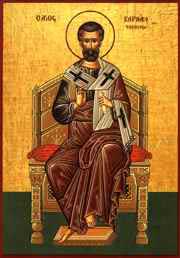Top Qs
Timeline
Chat
Perspective
June 11 (Eastern Orthodox liturgics)
From Wikipedia, the free encyclopedia
Remove ads
June 10 - Eastern Orthodox Church calendar - June 12

All fixed commemorations below celebrated on June 24 by Orthodox Churches on the Old Calendar.[note 1]
For June 11th, Orthodox Churches on the Old Calendar commemorate the Saints listed on May 29.
Saints
Pre-Schism Western saints
- Saints Felix and Fortunatus, two brothers, born in Vicenza in Italy, who suffered under Diocletian in Aquileia (296)[11][12][note 4]
- Saint Blitharius (Blier), born in Scotland, he went to France and settled in Seganne in Champagne (7th century)[11][13]
- Saint Herebald (Herband), born in Britain, he lived as a hermit in Brittany where a church is dedicated to him (8th century)[11][14][note 5]
- Saint Tochumra, a holy virgin venerated in Kilmore in Ireland; she was called on by women in labour.[11][16]
Remove ads
Post-Schism Orthodox saints
- Venerable Barnabas of Vasa, near Limassol in Cyprus, Wonderworker.[1][3][9][10][17][18][note 6]
- Venerable Barnabas of Vetluga, ascetic of Vetluga (1445)[1][6][9][10][19][20][21]
New martyrs and confessors
- New Martyr Zafeirios of Halkidiki (c. 1821)[9][22]
- 222 Chinese New Martyrs of the Boxer Uprising, at Beijing and other places (1900):[1][6][9][23]
- Hieromartyr Metrophanes, Chi Sung (Chang Tzi-tzung), Priest;
- his wife Presvytera Tatiana;
- his sons John and Isaiah, and Isaiah’s fiancée Maria;
- the church-school teachers Paul Wang and Ia Wen;
- and another 215 martyrs.
- New Hiero-confessor Luke (Voino-Yasenetsky), Archbishop of Simferopol and Crimea, Surgeon, Unmercenary Wonderworker (1961)[9][24][note 7] (see also May 29 )
Other commemorations
- Appearance of the Archangel Gabriel to a monk on Mt. Athos, and the revelation of the hymn "It Is Truly Meet" (Axion Estin) (982)[1][9][10][26][27]
- Icon of the Most Holy Theotokos "It Is Truly Meet" (Axion Estin) (10th century)[1][6][10][28][29]
- Translation of the relics (1572) of St. Ephraim of Novotorzhk, founder of the Sts. Boris and Gleb Monastery, Novotorzhok (1053)[1][6][10][30][31][32]
- Translation of the relics (c. 1592) of Saint Arcadius of Vyazma and Novotorzhk (1077)[1][10]
- Repose of the recluse Melania of Eletz and Zadonsk (1836)[1]
- Repose of Ivan Vasilievich Kireyevsky, philosopher and Patristic translator (1856)[1]
Remove ads
Icon gallery
- Apostle Bartholomew.
- Apostle Barnabas, founder of the Church of Cyprus.
- Hieromartyr Metrophanes, Chi Sung (Chang Tzi-tzung).
- 222 Chinese New Martyrs of the Boxer Uprising.
Notes
- The notation Old Style or (OS) is sometimes used to indicate a date in the Julian Calendar (which is used by churches on the "Old Calendar").
The notation New Style or (NS), indicates a date in the Revised Julian calendar (which is used by churches on the "New Calendar"). - "THE birthday of the apostle St. Barnabas, born in Cyprus. By the disciples, he was ordained apostle of the Gentiles with St. Paul, and with him traversed many regions, fulfilling his commission to preach the Gospel. At length he went to Cyprus, where he ennobled his apostolate by a glorious martyrdom. Through his own revelation his body was found, in the time of the emperor Zeno, together with a copy of St. Matthew's gospel copied with his own hand."[7]
- "At Aquileia, the martyrdom of the saints Feilx and Fortunatus, brothers. In the persecution of Diocletian and Maximian, they were racked, and had flaming torches held against their sides. These being extinguished by the power of God, boiling oil was poured over them, and as they persevered in confessing Christ, they were decapitated."[7]
- "HEREBALD, or HERBAUD, was a native of Great Britain, and, as it seems from his name, of an English family. He was granted to the earnest prayers of his parents, who had been long married, without the blessing of children. From his earliest days the child showed signs of extraordinary piety, love of prayer, and solitude, together with a spirit of mortification, and when he attained a more mature age forsook his father's house and all he had, to lead the life of a hermit in Brittany. After various difficulties and persecutions, he at length established himself in the parish of Berien, where his sanctity and miracles won the admiration of all men. In this spot he gave up his soul to God, and was buried in the church, which now bears his name."[15]
- A Cypriot chronographer has written that it is possible that St. Barnabas of Vasa was one of the "'300 Allemagne Saints" who settled in Cyprus in the 12th century. The 300 Allemagne Saints came to Cyprus from Palestine and lived as ascetics in various parts of the island.
Remove ads
References
Sources
Wikiwand - on
Seamless Wikipedia browsing. On steroids.
Remove ads



